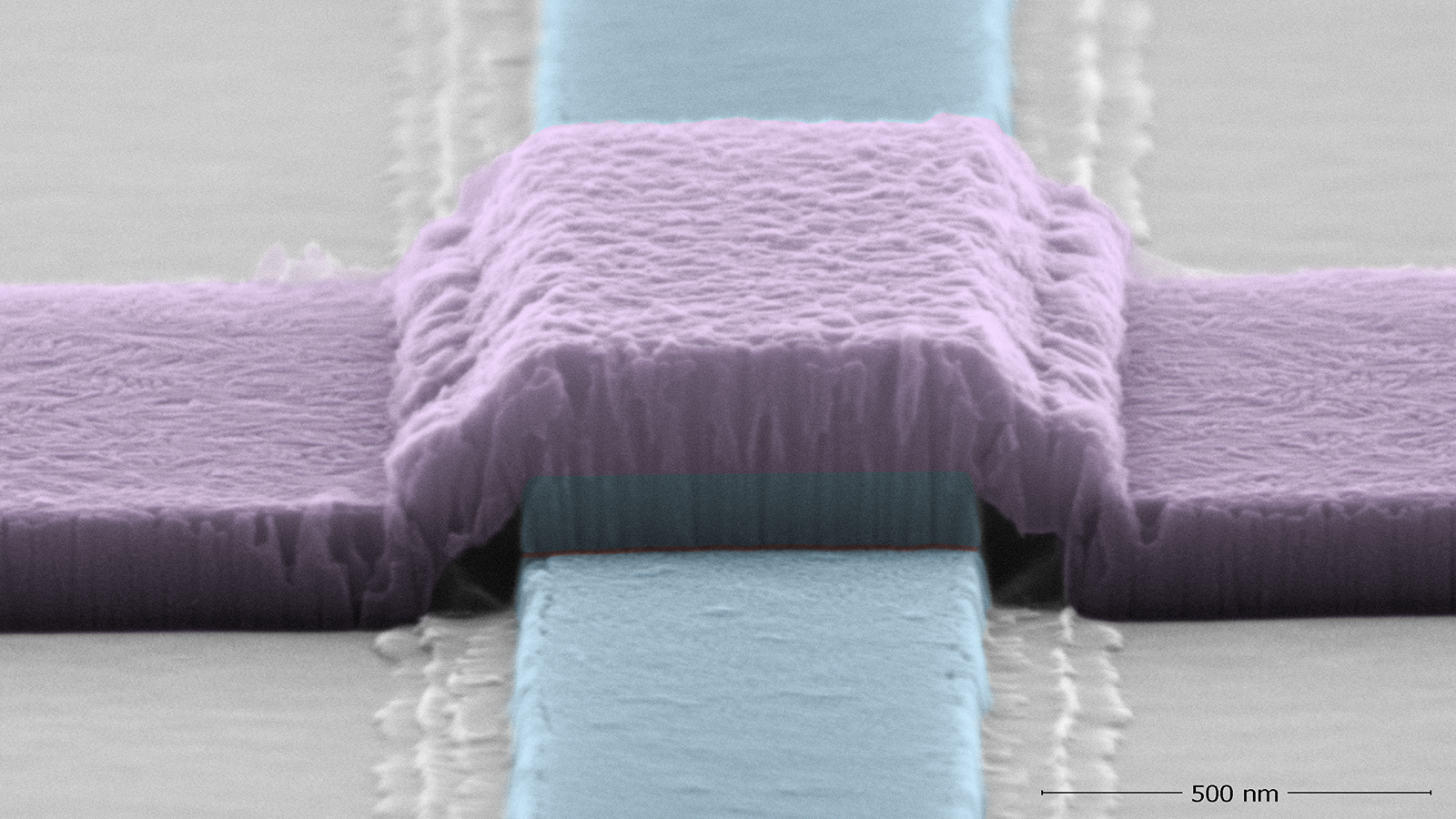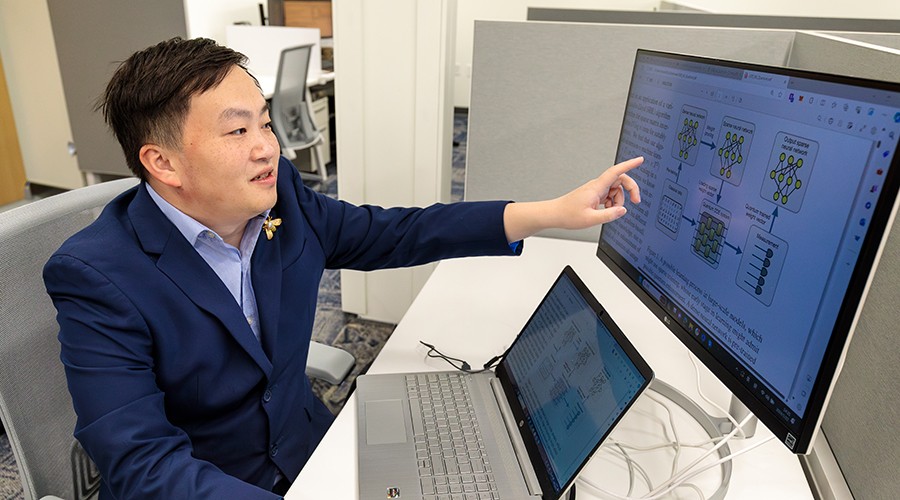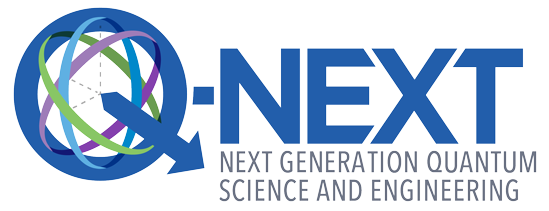University of Chicago
-
How quantum computing could help us understand the universe
From PBS NewsHour: David Awschalom appears in this piece on the next generation of computing, one that will be far more sophisticated and dependent on understanding the subatomic nature of the universe. Read More
-
PME-led research into protein-based qubits earns $2.75M Moore Foundation grant
Bolstered by a new $2.75 million grant from the Gordon & Betty Moore Foundation, a team led by University of Chicago's Peter Maurer will soon study qubits made from protein. Read More
-

Resurrecting niobium for quantum science
For years, niobium was considered an underperformer when it came to superconducting qubits. Now scientists supported by Q-NEXT have found a way to engineer a high-performing niobium-based qubit and so take advantage of niobium’s superior qualities. Read More
-
New research unites quantum engineering and artificial intelligence
From the University of Chicago: University of Chicago’s Liang Jiang, Argonne’s Yuri Alexeev and team demonstrate how incorporating quantum computing into the classical machine learning process has the potential to bring greater sustainability and efficiency to machine learning. Read More
-

New research unites quantum engineering and artificial intelligence
A team of researchers at Argonne National Laboratory, University of Chicago and other institutions shows how incorporating quantum computing into the classical machine-learning process can potentially help make machine learning more sustainable and efficient. Read More
-

Chloe Washabaugh creates designer molecules for the quantum future
Q-NEXT collaborator and UChicago grad student Chloe Washabaugh creates high-performance qubits from designer molecules. Not only is she expanding the applications of quantum devices, but she’s also working to attract a diverse audience to quantum. Read More
-
University, government, and industry researchers join forces to explore how quantum computing could aid financial institutions
From the Chicago Quantum Exchange: In a paper published in Nature Reviews Physics, a team of experts from Argonne National Laboratory, JPMorgan Chase, Fujitsu Research of America, Menten AI, the University of Chicago and the University of Delaware create a one-stop resource on the use of quantum computers to accelerate solutions for the finance sector. The paper discusses challenges in three categories at the intersection of finance and computing: optimization, machine learning and stochastic modeling. Read More
-

In novel quantum computer design, qubits use magnets to selectively communicate
Researchers have begun to use magnets to entangle qubits, the building blocks of quantum computers; the simple technique could unlock complex capabilities. Read More
-
IBM and top universities to advance quantum education for 40,000 students in Japan, South Korea and the United States
From PR Newswire: IBM has announced the company intends to engage with Keio University, the University of Tokyo, Yonsei University, Seoul National University and the University of Chicago to work together to support quantum education activities in Japan, Korea and the United States. IBM intends to deliver educational offerings, in combination with contributions from each of the participating universities, to advance the training of up to 40,000 students over the next 10 years to prepare them for the quantum workforce and promote the growth of a global quantum ecosystem. Read More
-
Hannes Bernien awarded the 2023 Klung Wilhelmy Science Prize for pioneering quantum work
From the University of Chicago: Q-NEXT collaborator Hannes Bernien of the University of Chicago has won the Klung Wilhelmy Science Prize in Physics for his pioneering early studies on defect centers in diamonds and work he is currently pursuing to develop quantum technology platforms based on Rydberg atoms. Read More
In the News
See all In the News-
The best qubits for quantum computing might just be atoms
From Quanta: Mark Saffman of the University of Wisconsin–Madison and Infleqtion is featured in this comprehensive overview of neutral-atom qubit research. Read More
-
How quantum computing could help us understand the universe
From PBS NewsHour: David Awschalom appears in this piece on the next generation of computing, one that will be far more sophisticated and dependent on understanding the subatomic nature of the universe. Read More
-
PME-led research into protein-based qubits earns $2.75M Moore Foundation grant
Bolstered by a new $2.75 million grant from the Gordon & Betty Moore Foundation, a team led by University of Chicago's Peter Maurer will soon study qubits made from protein. Read More
-
Infleqtion unveils 5-year quantum computing roadmap, advancing plans to commercialize quantum at scale
From Quantum Insider: Infleqtion shares a broad business update, including the first look at its new 5-year quantum computing roadmap. The roadmap's centerpiece is Sqorpius, the next phase of Infleqtion’s quantum computing program. Read More
-
Bringing quantum entanglement to the people
From the National Science Foundation: NSF’S Quantum Leap Challenge Institute Hybrid Quantum Architectures and Networks at the University of Illinois Urbana-Champaign, a Q-NEXT partner, has created a working demonstration that brings entanglement between photons to a public setting for the first time. Read More
